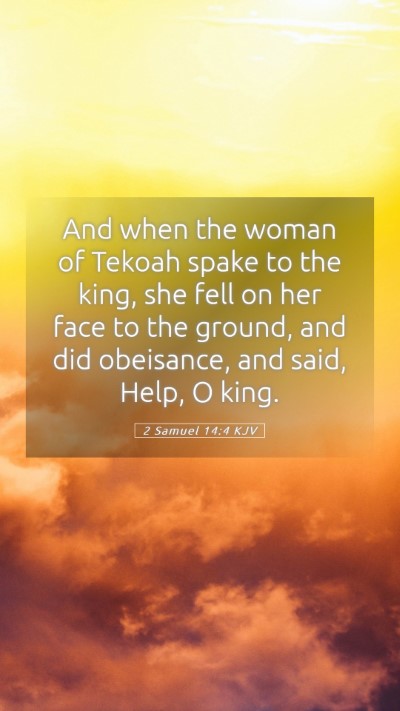Bible Verse Commentary on 2 Samuel 14:4
Verse: 2 Samuel 14:4 - "And when Joab saw that the king's heart was toward Absalom,"
Overview of the Verse
This verse is situated within the narrative concerning Absalom’s return to David after his rebellion and subsequent exile. Joab, the commander of David's army, perceives that David's heart yearns for his son Absalom. This recognition initiates a significant turn of events in the relationship between David and Absalom, highlighting themes of reconciliation and the complexity of human emotions.
Bible Verse Meanings
- Father-Son Relationship: The verse sheds light on David's feelings towards Absalom, showcasing a father's longing for reconciliation despite past grievances.
- Joab's Role: Joab acts as a mediator in this situation, understanding the king's emotions and prompting action toward restoring relations.
- The Significance of Emotions: This verse emphasizes the impact of emotional ties and how they can influence decisions and actions in leadership.
Insights from Public Domain Commentaries
Matthew Henry: Henry explains that Joab's insight into David's heart reveals the deep emotional connections within families, hinting at the possibility of forgiveness and renewal of bonds, even after betrayal and conflict.
Albert Barnes: Barnes notes that the heart of a king can be easily swayed by emotions, which can lead to significant decisions. He also emphasizes the importance of recognizing emotional dynamics in leadership.
Adam Clarke: Clarke remarks that the relationship between David and Absalom is filled with tension but also with hope. His commentary encourages readers to consider the possibilities of restoration in seemingly broken relationships.
Historical Context
This verse comes amidst the turbulent history of David's reign, particularly his relationship with Absalom, who had attempted to usurp David's throne. Understanding this context is crucial for interpreting the profound implications of their father-son dynamics and the political nuances involved.
Application in Daily Life
The verse encourages reflection on our own relationships. It prompts us to consider how love and forgiveness can overcome conflicts. Whether in personal or communal settings, understanding the emotional state of others can lead to healing and reconciliation.
Related Bible Cross References
- 2 Samuel 14:1 - Joab's motivations and plans for Absalom's return.
- 2 Samuel 18:33 - David's grief over Absalom, illustrating the depth of their relationship.
- Luke 15:20 - The parable of the Prodigal Son, highlighting themes of forgiveness and reconciliation.
Conclusion
This verse encapsulates critical elements of biblical teachings on family, reconciliation, and the complex emotions associated with leadership. Through Joab's observation, we see a glimpse of hope for restoration in the tumultuous relationship between David and Absalom, a poignant reminder of the enduring nature of parental love and the quest for reconciliation.
Further Bible Study Insights
Understanding 2 Samuel 14:4 can provide valuable reflections for Bible study groups and online Bible study participants. It can open discussions on how leaders respond to emotional needs of loved ones and the impact of reconciliation efforts in our lives.
Encouragement for Bible Study
As you engage in your Bible study lessons and explore Bible study tools, keep the lessons from this verse in mind. Use it as a foundation for exploring more about the complexities of relationships found throughout scripture and how these apply to your own life.


